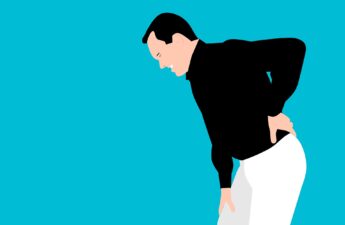For more than two decades, various studies have suggested that meditation and mindfulness — that is, being aware of the present moment — can help reduce and improve pain management, lending some credence to the notion that the brain can affect the body. Such results have helped the field grow into a multibillion-dollar industry, populated by meditation apps, guided workshops, and upscale retreats.
Yet the field has also faced sharp criticism from psychologists and researchers who say the health benefits are overstated and some of the research methodologically flawed.
Most people with chronic back pain naturally think their pain is caused by injuries or other problems in the body such as arthritis or bulging disks. But our research team has found that thinking about the root cause of pain as a process that’s occurring in the brain can help promote recovery.
Your biological age predicts dementia and stroke regardless of your actual age – new study
while we all grow older chronologically at the same pace, biologically, our clocks can tick faster or slower. Relying solely on chronological age – the number of years since birth – is inadequate to measure the body’s internal biological age.
Perimenopause usually begins in your 40s. How do you know if it has started?
Perimenopause usually begins in the early to mid-40s. Some people even begin perimenopause earlier, due to premature ovarian insufficiency or medical treatments such as chemotherapy or surgical oophorectomy (ovary removal).
How can I get some sleep? Which treatments actually work?
You might have tried breathing exercises, calming music, white noise, going to bed in a dark and quiet bedroom, eating different foods in the evening, maintaining a regular sleep pattern, or reducing caffeine. But after three to four weeks of what seems like progress, your insomnia returns. What next?
Amid Regulatory Gaps, Telehealth Prescribers Flourish
It’s easier than ever to get prescription drugs online. Should regulators be paying more attention?
Modern medicine has its scientific roots in the Middle Ages
How the logic of vulture brain remedies and bloodletting lives on today
Older adults want to ‘age in place,’ but their options are limited in most states
As America gets grayer, advocates are pushing for new types of housing. By Robbie Sequiera, Staff ReporterStateline As older adults begin to outnumber young people in the United States in the coming decade, advocacy groups are challenging states to shift…
The roots of the North American opioid crisis, and 3 key strategies for stopping it
The traditional “war on drugs” approach that focuses only on criminalization has been unsuccessful. In reality the data shows that illegal drug prices have fallen whilst purity and deaths have increased. Overdose deaths have also increased in prisons showing that places with even the highest level of security are vulnerable to drug smuggling.Focusing on the opioid crisis through a public-health approach includes massively increasing access to care and treatment for patients experiencing substance use disorder. It requires more evidence-based services such as addiction clinics, psychotherapy harm reduction strategies and education for both patients and families about treatments that are available to them.Beyond initial treatment there should be continued professional social support and a wider national effort to address the socioeconomic causes in disadvantaged communities.
Can I actually target areas to lose fat, like my belly?
Our bodies decide where we store fat and where we lose it from first. And over-the-counter pills and supplements cannot effectively target fat loss either.
What is ‘fried rice syndrome’? A microbiologist explains this type of food poisoning – and how to avoid it
A condition dubbed “fried rice syndrome” has caused some panic online in recent days, after the case of a 20-year-old who died in 2008 was resurfaced on TikTok.
“Fried rice syndrome” refers to food poisoning from a bacterium called Bacillus cereus, which becomes a risk when cooked food is left at room temperature for too long.
The 20-year-old college student died after reportedly eating spaghetti that he cooked, left out of the fridge, and then reheated and ate five days later. Although death is rare, B. cereus can cause gastrointestinal illness if food isn’t stored properly. Here’s what to know and how to protect yourself.
Health insurance, now open to all; Enrollment starts Nov.1
Starting this year, Washington Healthplanfinder has expanded access to health coverage to include immigrants who are undocumented. More Washingtonians than ever will have the opportunity to buy an insurance plan that covers important health care services.
How do stimulants actually work to reduce ADHD symptoms?
Stimulant drugs are thought to alter the activity of key neuotransmitters, dopamine and noradrenaline, in the brain. These neurotransmitters help with attention and focus, among other things.
Medical exceptions to abortion bans often exclude mental health conditions
Despite mental health conditions making up more than 20% of maternal deaths and 1 in 5 women suffering maternal mental health conditions, several states explicitly exclude mental health conditions as exceptions to abortion restrictions.
Naloxone now available over the counter in King County
The medication naloxone, brand name Narcan, that can reverse the effects of an opioid overdose is now available over the counter in King County.













